Photo: Jathan Campbell
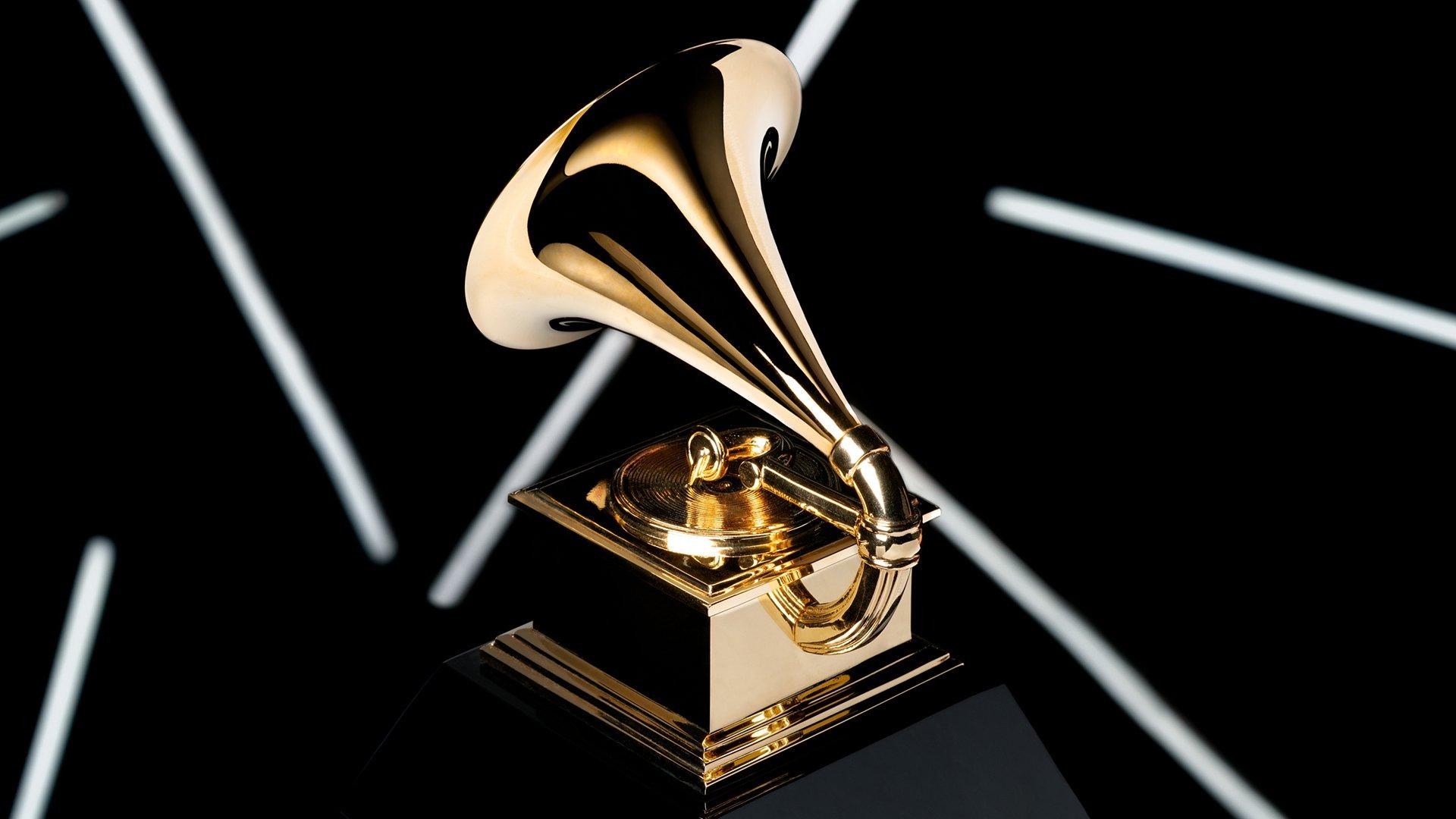
feature
Behind The GRAMMY: Why The New Best Spoken Word Poetry Album GRAMMY Category Is A Global Victory For Lovers Of Language
In this roundtable with Recording Academy leaders and poetry and spoken word creatives, learn how the Best Spoken Word Poetry Album GRAMMY category was created - and where it's going next.
It's fair to say that the Recording Academy has honored the spoken word community for some time. At the 2022 GRAMMYs, Don Cheadle won the GRAMMY for Best Spoken Word Album for Carry On: Reflections For A New Generation From John Lewis. (Cheadle won out over greats like LeVar Burton, J. Ivy and Dave Chappelle — and even former U.S. President Barack Obama.)
Still, the wider Spoken Word GRAMMY Field — which houses the Best Audio Book, Narration & Storytelling Recording category, formerly known as the Best Spoken Word Album — continues to evolve. And when the growing spoken word and poetry communities spoke out about equal representation in the industry, the Recording Academy listened — and responded.
At the upcoming 2023 GRAMMYs, officially known as the 65th GRAMMY Awards, the Recording Academy will award the first-ever GRAMMY Award for Best Spoken Word Poetry Album. The GRAMMY category addition comes along with several other new categories and awards, including Songwriter Of The Year (Non-Classical) and Best Score Soundtrack For Video Games and Other Interactive Media, among many others.
The 2023 GRAMMY nominations are officially here. See the complete list of nominees across all 91 GRAMMY categories.
"For me, it was an exciting opportunity because we were also hearing a lot from the spoken word community," Recording Academy CEO Harvey Mason jr. said about the addition of the new Best Spoken Word Poetry Album GRAMMY category. "All of our changes and reactions to what's happening are always going to be fluid; we're always going to evolve our categories. We're going to continue to make sure we're representing music in the way that it's being created," he added.
For those looking to submit their works in the first-ever Best Spoken Word Poetry Album category at the upcoming 2023 GRAMMYs, make sure to submit your works during the Online Entry Process (OEP), which is open now and closes on Wednesday, August 31, at 6 p.m. PT/9 p.m. ET. Recording Academy members and media companies can submit entries for GRAMMY consideration for this category through the OEP website. Only albums released between Friday, Oct. 1, 2021, through Friday, Sept. 30, 2022, are eligible for this category at the 65th GRAMMY Awards.
What's best, the GRAMMY nominees, and ultimately the winner, in the Best Spoken Word Poetry Album category will be decided by peers within this genre. Voting members who choose the Spoken Word Field as one of the three fields in which they are peers will vote on this inaugural GRAMMY category during First Round Voting (Thursday, Oct. 13, 2022 – Sunday, Oct. 23, 2022) and Final Round Voting (Wednesday, Dec. 14, 2022 – Wednesday, Jan. 4, 2023). Anyone who's interested in becoming a new member of the Recording Academy should apply for membership by Wednesday, March 1, 2023, to be part of next year's class.
In this exclusive roundtable interview, Recording Academy leaders, including Academy CEO Harvey Mason jr., as well as poetry and spoken word luminaries discuss the founding of the inaugural Best Spoken Word Poetry Album GRAMMY category, why it matters to represent this artistic community, and how the Academy plans to continue celebrating and uplifting the spoken word poetry community.
Why is it important for the Recording Academy to add this category, which honors excellence and spoken word albums, specific to the performance of poetry with or without music?
Harvey Mason jr., CEO, the Recording Academy: People have been telling stories and using this spoken word art form as a means to create and communicate.
For me, it was an exciting opportunity because we were also hearing a lot from the spoken word community.
We started putting spoken word, audio books and some other things, all in one category [Best Spoken Word Album]. And as we started hearing from the spoken word community, they became more and more active.
The Awards and Nominations [A&N] committee and Board of Trustees, who passed this proposal [for the Best Spoken Word Poetry Album GRAMMY category addition], realized that there was space needed to recognize this group and this genre — specifically and independently of how they're being recognized previously.
All of our changes and reactions to what's happening are always going to be fluid; we're always going to evolve our categories. We're going to continue to make sure we're representing music in the way that it's being created.
And when we hear from music makers and creators, we're going to listen. When it makes sense, we'll change. And this is something that was brought to our attention that made a lot of sense. I'm thankful to the A&N committee and the proposal creators that we were able to bring this up and establish a new, important category.
J. Ivy, CEO, Word & Soul, LLC; GRAMMY-nominated spoken word poet: It's important because the Recording Academy's mission is to honor the best in music. It's important because poetry is, in fact, a big part of music. It's important because spoken word poets and spoken word artists have been pushing the culture forward with their words, their ideas and their performances since the beginning of time.
Poetry has always uplifted the people, it has always inspired the people. It has motivated the masses to push through their struggles and fight to be more. Poetry has always left the world in a better place. Poetry has not only changed lives, but it has saved lives. The poet has always been and will always be a very vital part of our culture and our music, and it's only right that the Recording Academy and the music community as a whole acknowledge and honor the tremendous work poets put into the world with their spoken word poetry albums. I couldn't be prouder to be a part of this moment.
*J. Ivy. | Photo: Emmai Alaquiva*
Seeing how the Best Spoken Word Poetry Album is a first-year category, why is it important for poets, artists and creators to submit their recordings into this new category for GRAMMY consideration this year?
Jalyn Nelson, Project Manager, Awards, the Recording Academy: This being a first-year category is the reason it is so important for poets, artists and creators to submit their recordings for consideration. Entries are what keep our categories strong and healthy, and with a new category, it's so important to receive those entries so that the category can sustain — and properly reflect — the vast variety of work being created in these communities.
Mason jr.: For a first-year category — or any category for that matter — the amount of submissions equates directly to the health of the category. If you're getting a low number of submissions, it's not a healthy category, and that would be a category that would be addressed by the A&N committee in subsequent years.
So, you want to make sure when you have a category — especially a newer one — that you're getting enough submissions so that it's deemed healthy and it can remain a viable category on the ballot year to year. This year, in particular, everyone will be watching. The A&N committee will be watching, the Trustees will be watching to see how the category performs, as far as submissions.
In this first year, it is important to make sure there are enough submissions to make this category feel relevant, feel like a part of our process, be fair, and have enough entries so that we can evaluate music and award someone for their excellence.
J. Ivy: It's important for poets and spoken word artists to submit because we want to make sure the category stands the test of time. We need this category to stay, so we need the poets to submit their albums year after year. We need poets bringing home GRAMMYs year after year.
*Sekou Andrews | Photo: Sun & Sparrow Photography*
Sekou Andrews, CEO, Poetic Voice; GRAMMY-nominated spoken word poet: We have opened the door and told the Academy that poets will come through it. So now it's time for poets to show up. We need to prove that spoken word poets can sustain a healthy category rich with submissions year after year.
I would also add that we need to step up our game and make sure we are submitting GRAMMY-caliber albums. As we expand our voice and impact from local open mics to global stages, we need to take pride in maintaining high standards as recording artists who are not just amazing on stage, but who can deliver world-class, professionally recorded projects that reflect the beauty and power of our art form.
Ryan Butler, Vice President of Diversity, Equity & Inclusion, the Recording Academy: It's of utmost importance that poets, artists and creators submit their recordings in this new Best Spoken Word Poetry Album category because getting it on the ballot was just the first step. We now need the spoken word community to come together and submit their work. Representation across the music community matters, and while we heard the community and the category is officially on the ballot, it's now in the hands of the creators to submit for consideration and keep the category healthy for years to come.
Read More: How Contemporary Musicians Are Embracing The Spoken Word Album
The Best Spoken Word Poetry Album GRAMMY category will be voted on by Recording Academy Voting Members who are peers in the wider Spoken Word Field. Why is it important for poets and spoken word creators to join the Recording Academy as voting members to vote in these specific categories and fields?
Andrews: The GRAMMYs are not a poetry slam. This is not a local stage where we show up and get scored by random judges who may have no connection to the artists or the art form itself. No, this is a global stage where we finally get to show up and be celebrated by our fellow peers who recognize the dopest poems, respect the dopest work, and are often the dopest poets in our genre themselves.
Black Americans are often urged to vote in political elections because our ancestors fought, bled and died to give us the right to vote. But just like with political elections, it only works if poets use their voice, place their vote, and actually engage in showing the world the best of our art form as only we know it.
Nelson: One of the most important ways to get involved with the Recording Academy is to join as a member. Members are the ones who submit for consideration and vote for our nominees — and, ultimately, our winners. What makes the GRAMMY unique is that it is peer-awarded, and having a well-represented community of poets and spoken word creators in our voting body ensures that.
*Ryan Butler | Photo: Aaron Doggett for Visyoual Media*
Mason jr.: I think what makes the GRAMMY special is the fact that it's awarded by music professionals and people working in the industry, as opposed to a popular vote or fan vote, or the committee voting or advertisers deciding who will make a good TV show.
GRAMMYs are given away by your peers. To remain relevant and continue to have a significant impact, we have to make sure people who are making a specific genre of music are voting within that genre, evaluating submissions critically, and voting on which one they thought was the best for that year.
To do that, you have to have people knowledgeable in specific genres, categories and crafts. So, we need to make sure that the people that are working in the industry and creating all this amazing music and art are actually voting for who we honor every year.
Black Americans are often urged to vote in political elections because our ancestors fought, bled and died to give us the right to vote. But just like with political elections, it only works if poets use their voice, place their vote, and actually engage in showing the world the best of our art form as only we know it.
*—Sekou Andrews*
Butler: Representation matters! Your voice matters! Becoming a voting member and voting amongst your peers is the best way to represent the category and the community. Membership is the core of the Recording Academy. Building an active, representative and inclusive membership base that embodies our diverse music community is fundamental to everything we do.
This past June, we extended membership invitations to more than 2,700 highly qualified music professionals from wide-ranging backgrounds, genres and disciplines. Every corner of the industry was represented in this new class, from jazz to reggae, classical to spoken word, songwriters to instrumentalists, and beyond.
Read More: 2023 GRAMMYs Explained: 6 Reasons To Be Excited About The New Categories & Changes
What is the relationship between the poetry and the music communities? What bonds these two art forms?
J. Ivy: On my last album, Catching Dreams, I have a poem called "The World Needs More Poets." Within that poem, there's a phrase that says, "Poetry is the seed of every song ever written." Poetry has always been the deepest root of our creativity. Every day, we find ourselves listening to music where poetry is sung, we listen to music where poetry is rapped, and we listen to music where poetry is spoken. This beautiful art form has been an important part of our history, our ideology, our creativity, our education, our legacy, and our music.
Oftentimes, you'll see the genre of spoken word poetry cross paths with other genres. You'll see beautiful collaborations where poets work with hip-hop artists, gospel artists and R&B artists. You'll hear poets on blues, gospel, country, and house music albums because everyone has always had a deep appreciation for the unique perspective and flow that only a poet can bring. What artist isn't a poet at heart? This is why there will always be a strong bond between poetry and the music community. They're one and the same, which is why the demand for poetry and poetry & music has grown over the years.
Read More: J. Ivy On The Art & Craft Of Spoken Word
Butler: Poetry and music have intersected for centuries. The two art forms coexist harmoniously, and much of what we hear in modern-day music is derived from poetry and spoken word. We at the Recording Academy know the significance of spoken word and listened to the community, and the Diversity, Equity and Inclusion (DEI) department hosted a series of listening sessions, with one spearheaded by poet and recording artist J. Ivy. What resulted from this listening session was the need for spoken word to be properly represented as a GRAMMY category. The Awards and DEI teams worked with J. Ivy on creating a proposal for the Awards & Nominations Committee to review.
Andrews: Take any beautifully written song and strip away the music; you will likely find a poem. Take any poem, add melody, and you may have created a song. I dare you to tell me that Maya Angelou's "Still I Rise" wouldn't be a hit song in the hands of Paul McCartney or Beyoncé. Try to convince me that an anthology of Prince lyrics couldn't win poetry awards. The two art forms have been siblings since metaphor found melody. Having them both honored by the Academy goes without saying … but I'm a poet, so very little goes without saying.
*Jalyn Nelson | Photo: Janae Small*
What was your reaction to the development and announcement of the Best Spoken Word Poetry Album GRAMMY category?
J. Ivy: In the past 20 years, Sekou Andrews, Amir Sulaiman, and I have been [some of the] only spoken word poets nominated in the Best Spoken Word Album category, because audio books, which are also included in the Spoken Word field, dominated the category. As the Recording Academy, I understood wanting to award audio books, but I also knew that we could no longer compare apples and oranges.
I'm a huge fan of audio books, but as a poet who has been performing for almost 30 years, I can tell you with confidence that the two are not the same thing. Not wanting to see this continue, not wanting the frustration to keep piling on to the poetry community, with the help of some of the brightest minds in music, I wrote a proposal asking that the Recording Academy split the category and redefine the definition of spoken word poetry so that the poets could finally have our own place at the GRAMMYs.
As a [Recording Academy] Trustee, I had the privilege of voting on the proposal and being in the Zoom room when it came up for discussion. To see [the proposal] pass after years of working on it, after countless hours spent in meetings and on phone calls, it was overwhelming, to say the least. Immediately after the vote, I spoke about how important this [change] is to the culture. I spoke about how this is a game-changer. I spoke about how many lives this will affect for generations to come. Then I cut my camera off because I couldn't help but ball my eyes out as my entire body trembled with joy. I knew that this was and is a historic moment. I'm still amazed that it's real.
The creation of this GRAMMY category reflects how much the Recording Academy truly respects and recognizes the importance of this art form … We are very excited to continue to support and celebrate these communities and their creative efforts.
*—Jalyn Nelson*
Andrews: My reaction to the announcement of this category was more than just excitement: It was the feeling of both pride and triumph. Pride, because my purpose in my career has been to help pioneer a mainstream industry for spoken word poetry. Having our art form properly recognized by the Recording Academy is a huge step toward that goal. Triumph, because fulfilling that purpose is a constant battle for a poet. Since we don't have a mainstream industry, poets are endlessly fighting for our place at every table.
When it comes to the GRAMMYs, my friend J. Ivy and I have probably been the two poets at the forefront of that fight over the past few years. I was fighting from outside the system, audaciously chasing a nomination against all odds, while he has been fighting from within as a Chapter President and now Trustee. I like to think that I took point on kicking down the door, and he took point on building a new door and changing the locks. Both have been critical toward making it easier, in the future, for poets to be represented in the Academy and in the music and entertainment industries at large.
What impact will this new Best Spoken Word Poetry Album GRAMMY category make on the poet and poetry community?
Nelson: Our hope is that this new category will create excitement and ultimately encourage and strengthen the poetry and spoken word communities. To know that they have their own GRAMMY category where they can be recognized, celebrated, and awarded a GRAMMY for the work they so passionately create will hopefully encourage the community to create even more, and in the long run, inspire others in this generation and the next to do the same.
J. Ivy: This is a literal shift in culture. I feel that this category will put a lot more eyes and ears on the work that poets do when it comes to our recordings and live performances. I think the more light that is shined on the craft, the more creatives will be inspired to want to become a part of it. I think in the years to come, you'll see kids growing up aspiring to be poets and seeing that they can thrive in their careers while doing it.
So many in the past have shared this passion for the art, but didn't see a way to sustain themselves or their families. I feel that we now have a chance to change the decisions and outcomes of so many artists who come into the world and have a true passion for the art of poetry. I think labels, who have historically shied away from signing poets, will be inclined to offer those record deals [to them]. I think those who choose to remain independent artists will have access to more revenue streams, which in turn will support the dreams and missions of poets across the world.
We now have a chance to change the decisions and outcomes of so many artists who come into the world and have a true passion for the art of poetry.
*—J. Ivy*
Andrews: A GRAMMY nomination or GRAMMY Award is one of the most respected metrics for identifying recording artists who have achieved a high level of success and respect from peers. For most musicians, that metric can translate into record deals, sales, and the ability to sustain a successful career. That is what I want for spoken word poets, and this new category is an unprecedented step toward that.
What does the addition of this new GRAMMY category say about the Recording Academy's recognition and support of the creativity and importance of the poetry genre?
Nelson: The creation of this GRAMMY category reflects how much the Recording Academy truly respects and recognizes the importance of this art form. Poets and spoken word creators have always been around making albums; their impact historically and culturally as activists and thought leaders is immeasurable. We are very excited to continue to support and celebrate these communities and their creative efforts.
J. Ivy: It says that the Recording Academy is listening to the needs of the music community and is willing to make the necessary changes. From the moment I spoke up about the need for this change, the Academy was all ears and offered so much help in making this happen. In my experience, the Recording Academy is working to be both a strong reflection of the culture and a huge support to those that create those works of art, which help the world spin in a more peaceful way. To me, seeing the change happen in real time was a huge example of the Recording Academy living up to the promise of being of service to the music community.
How would you like to see the Recording Academy continue to honor the poet and poetry community in the years to come?
Andrews: I believe in the power of words. So my version of the future sees more spoken word artists collaborating with the Academy on major entertainment and advocacy projects. I see poets giving a powerful voice to Academy initiatives in the way that only we can. I see us becoming increasingly involved in the Academy as members, Chapter leaders, Trustees, and hell, even Academy President one day.
But my greatest vision for the future of spoken word poetry in the Academy came to me a few years ago when I wrote the poem "The Music Movement," from my album that got the GRAMMY nomination. I sought to be the first poet to perform that poem at the GRAMMYs, with major recording artists from multiple genres celebrating the power of music and the ways it makes our world better. It didn't happen for me then, but it will for one of us poets one day. And a win for any of us is a win for the art form.
This is a literal shift in culture. I feel that this category will put a lot more eyes and ears on the work that poets do when it comes to our recordings and live performances. I think the more light that is shined on the craft, the more creatives will be inspired to want to become a part of it. I think in the years to come, you'll see kids growing up aspiring to be poets and seeing that they can thrive in their careers while doing it.
*—J. Ivy*
J. Ivy: I would love to see this category live long past my years. I would love to see more programming centered around the art form of spoken word poetry. Yes, poets are educators, but poets are entertainers, too. The more the Academy can do to uplift and support the craft, the more poets will have opportunities to not only bring home GRAMMYs, but also be a part of GRAMMY night, the GRAMMY stage, and the GRAMMY experience. In turn, more doors will open and more honor will be brought to the art of poetry. The world needs more poets, and the more the Academy supports this beautiful art form that I love with all my heart and soul, the more poets we will see in the world.
The Evolution of Video Game Music: From 8-Bit To The Metaverse And The GRAMMYs
Inside The 2023 GRAMMYs
Ahead of the 2023 GRAMMYs, taking place Sunday, Feb. 5, read more about the current nominees and upcoming awards show.
All The GRAMMY Nominees: See the complete 2023 GRAMMY nominations list across all 91 GRAMMY categories.
Your GRAMMY Guide: Here's everything you need to know about the 2023 GRAMMYs.
Watch Guide: Here's where & how to watch the 2023 GRAMMYs in full.
Album Of The Year: Listen to the Album Of The Year nominees.
Song Of The Year: Hear the Song Of The Year nominees.
Best New Artist: Meet the Best New Artist nominees.
Record Of The Year: Explore the Record Of The Year nominees.
GRAMMY Firsts: Learn about this year's history-making nominations & GRAMMY firsts.
Relive The Magic: Rewatch the 2023 GRAMMY nominations announcement in full.
Beyoncé Makes GRAMMY History: Learn how Beyoncé set a new GRAMMY record.
What's new: Learn about the new GRAMMY categories being introduced at the 2023 GRAMMYs.
GRAMMYs Explained: 6 reasons to be excited about the 2023 GRAMMYs.
Music For Now: Learn how the new Best Song For Social Change award will impact music.
Behind The Hits: Learn why the new Songwriter Of The Year GRAMMY Award matters for the music industry.
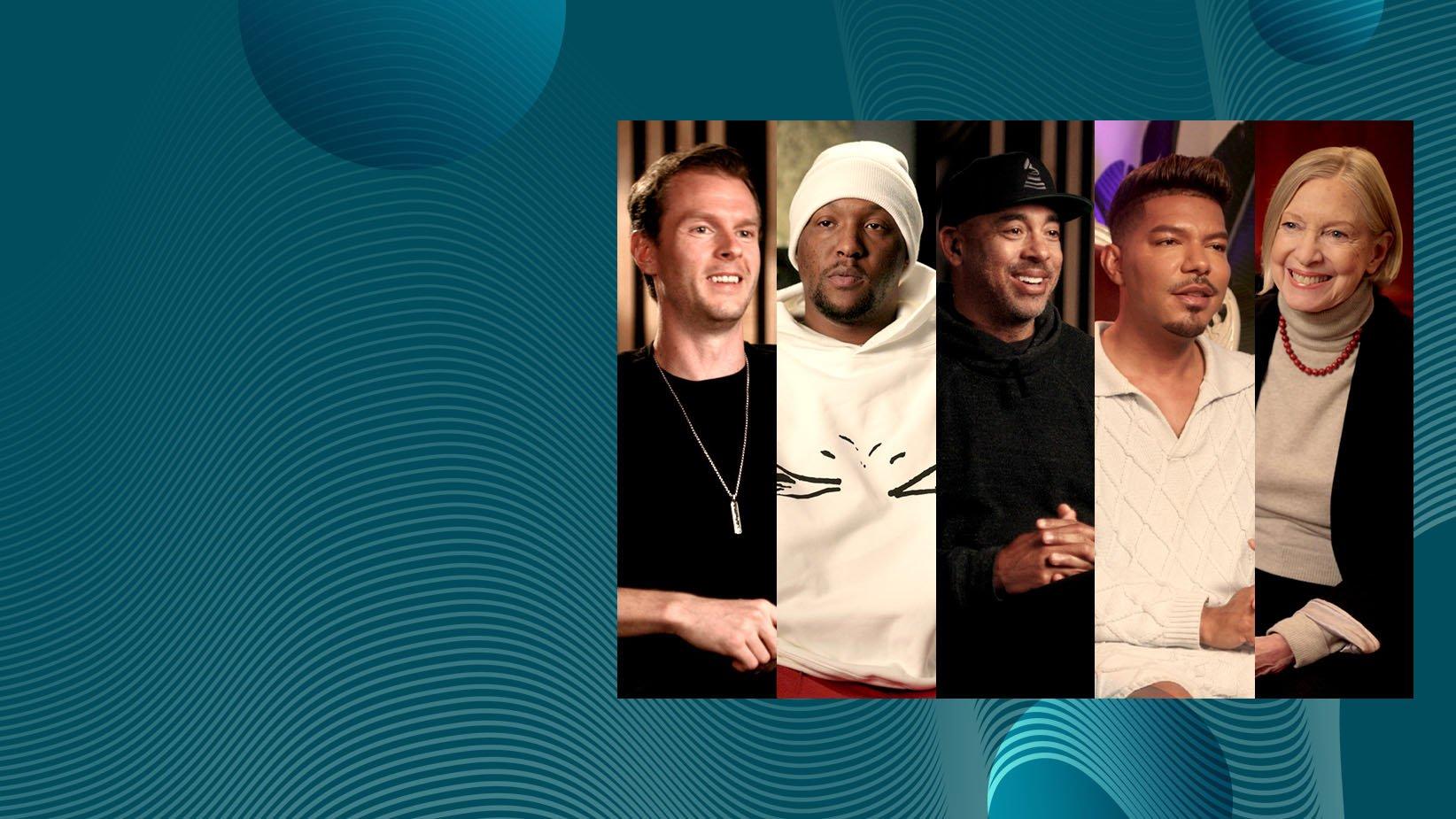
Photos Courtesy of the Recording Academy
news
The New GRAMMY GO Music Production Course Is Now Open: Featuring GRAMMY Winners Hit-Boy, CIRKUT, Judith Sherman & More
Enrollment is now open for GRAMMY GO's new specialization, "Music Production: Crafting Award-Worthy Songs," featuring appearances by GRAMMY winners and nominees. Learn music production and creative strategies from today's industry leaders.
Editor’s Note: Updated to add the Instagram Live video featuring Harvey Mason jr. and Stevie Mackey.
The Recording Academy continues its mission to empower music's next generation with the launch of its second specialization in the GRAMMY GO platform: "Music Production: Crafting Award-Worthy Songs."
This new course, a partnership between the Recording Academy and leading online learning platform Coursera, aims to bolster the technological and audio skills of music producers of all levels. The course, taught by Howard University professor and GRAMMY nominee Carolyn Malachi, features appearances by three-time GRAMMY winner and rap icon Hit-Boy, chart-topping and GRAMMY-winning producer/songwriter CIRKUT, artist and celebrity vocal coach Stevie Mackey, five-time GRAMMY nominee and Recording Academy CEO Harvey Mason jr., and 15-time GRAMMY winner Judith Sherman.
Enrollment for "Music Production: Crafting Award-Worthy Songs" is open now.
Mixing a unique blend of theory and practice, the course teaches music creators of all levels the advanced skills and tools to develop the mindset and confidence of an experienced producer and produce songs of the highest industry standards across all genres. Explore the wide-ranging roles of a music producer, develop critical listening and analysis skills, and master the technical aspects to create music and compositions that cut through the noise. The course's applied learning approach allows learners to sharpen their pre-production skills, utilize Digital Audio Workstations (DAWs) effectively, and produce vocals, instrumentals and samples collaboratively. Through critical listening exercises and discussions, learners will refine their abilities to deliver professional-quality demos.
To celebrate the launch, the Recording Academy hosted an Instagram Live session on Tuesday in which guests Harvey Mason jr. and Stevie Mackey discussed the evolving role of music producers, strategies for working with artists, key elements of top-notch productions, common mixing mistakes, tips for keeping the creative process fresh, and enrollment details for the course.
Building on the success of its first specialization, "Building Your Audience for Music Professionals," GRAMMY GO continues to offer industry-focused education tailored for emerging and established music creators and professionals alike. The innovative platform provides learners with real-time insights from leading music industry figures, ensuring the content remains practical and up to date. GRAMMY GO will also serve as an essential tool in the Recording Academy's global expansion into Africa and the Middle East, empowering music creators through enhanced training, bridging knowledge gaps, and fostering connections within the global music community.
Launched in April in partnership with Coursera, GRAMMY GO is the Recording Academy's first creator-to-creator platform, offering innovative courses tailored for both emerging and established music professionals. The initiative accelerates the Academy's global mission and reinforces its commitment to music education, providing a seamless bridge between all Academy initiatives.
Learn more about GRAMMY GO and the "Music Production: Crafting Award-Worthy Songs" and "Building Your Audience for Music Professionals" specializations.
Watch the Instagram Live session with Harvey Mason jr. and Stevie Mackey in full below:
More Music Education News & Initiatives
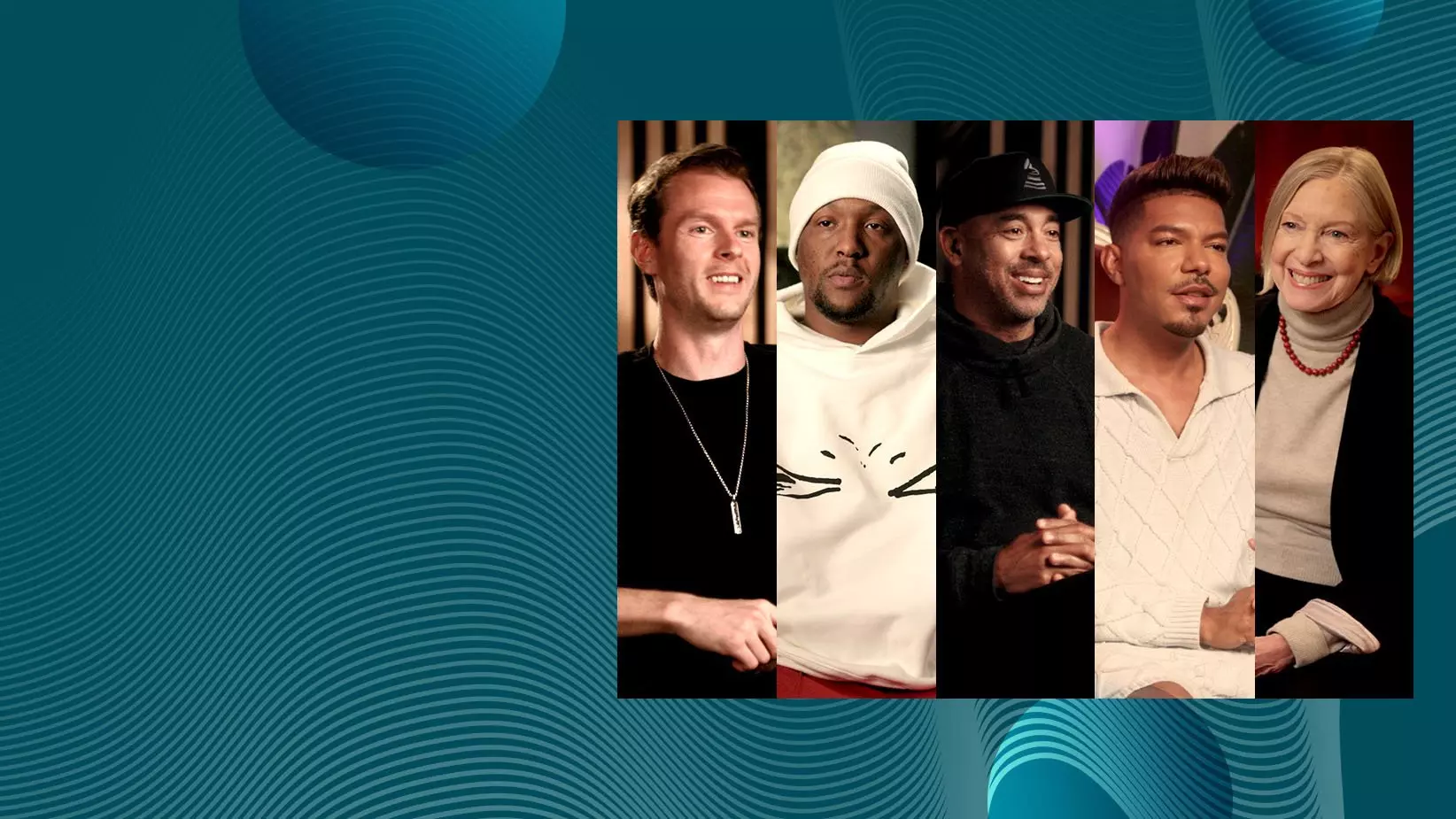
The New GRAMMY GO Music Production Course Is Now Open: Featuring GRAMMY Winners Hit-Boy, CIRKUT, Judith Sherman & More
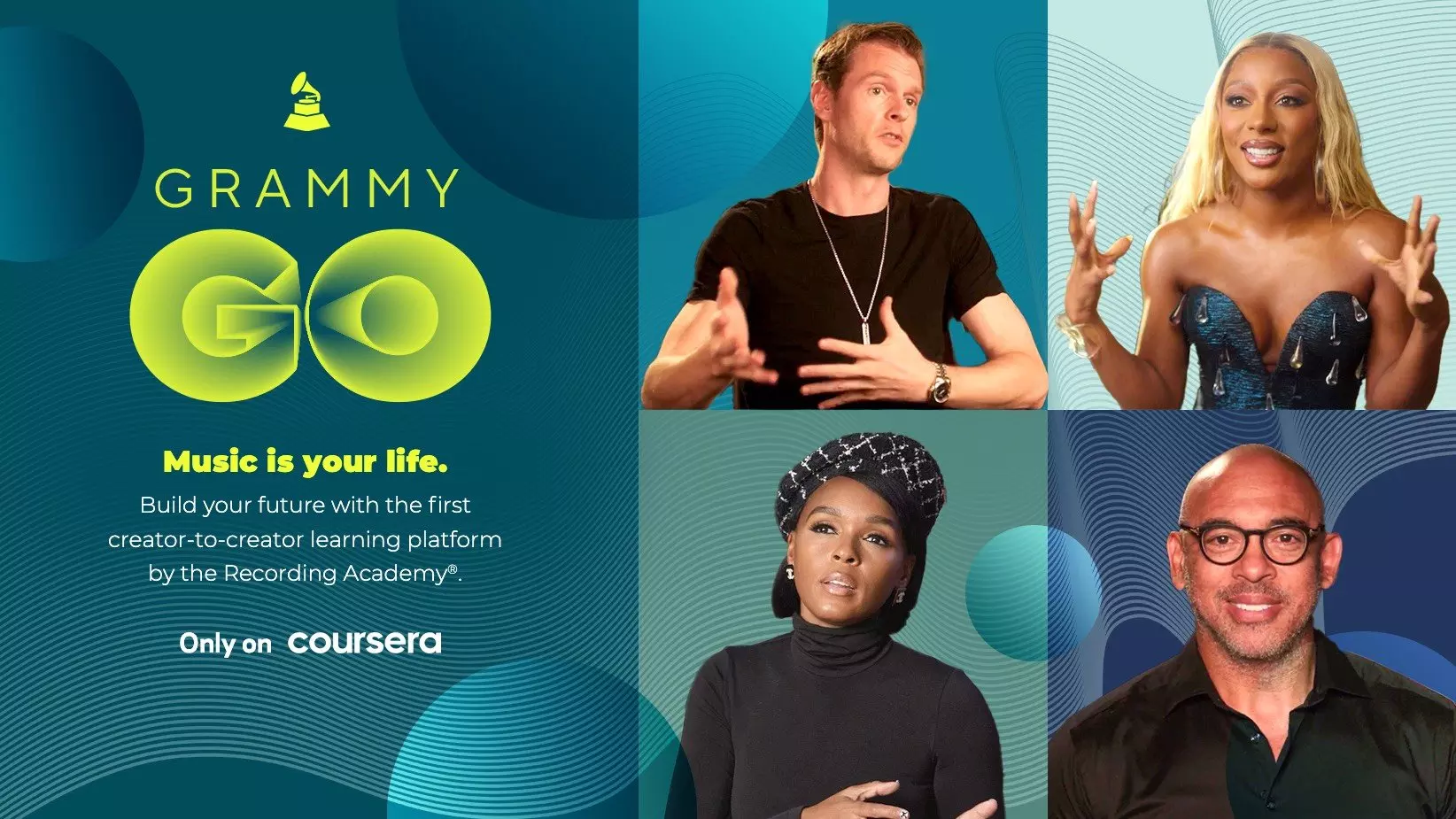
Recording Academy & Coursera Partner To Launch GRAMMY GO Online Learning Initiative
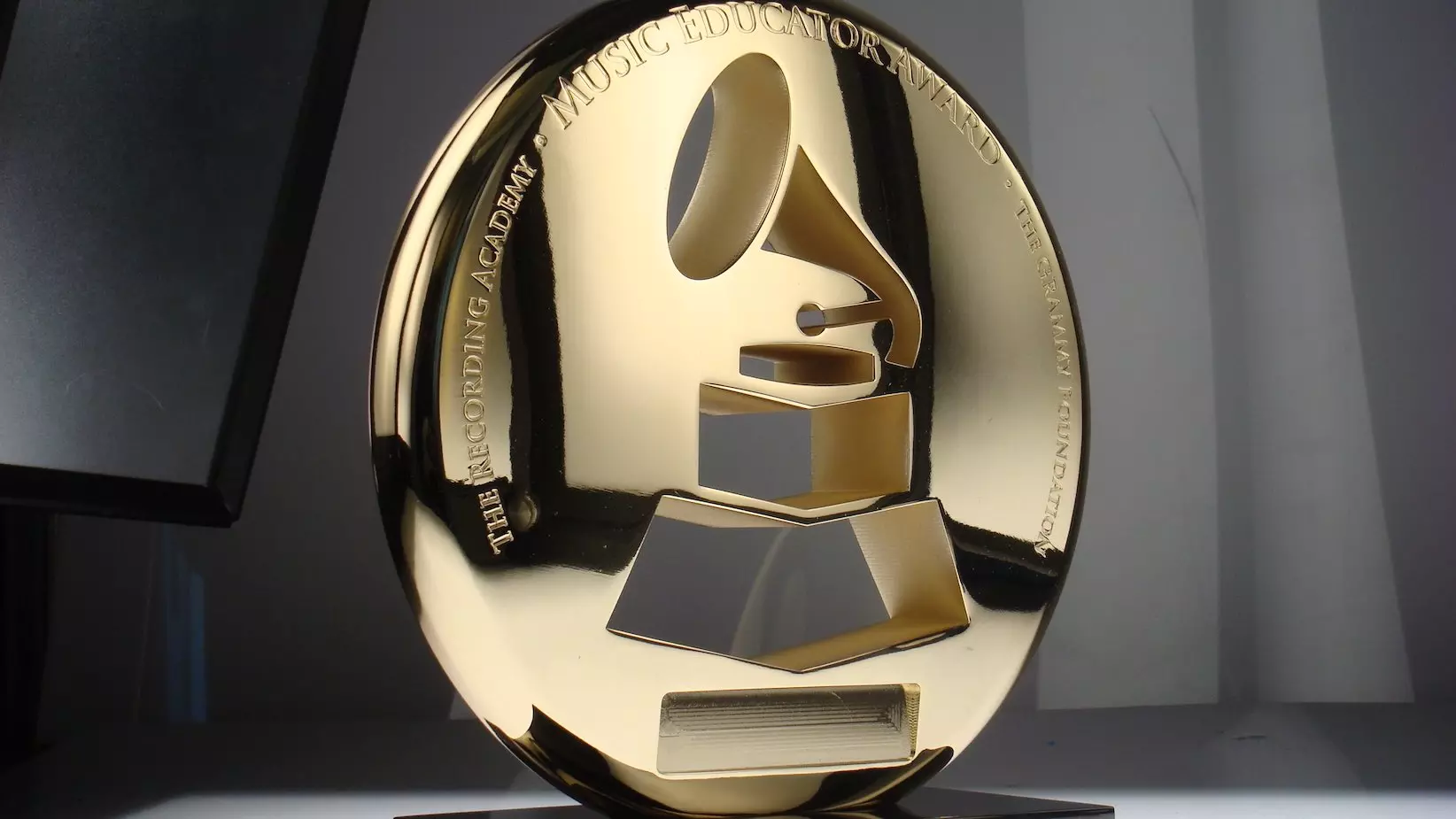
25 Semifinalists Announced For The 2024 Music Educator Award
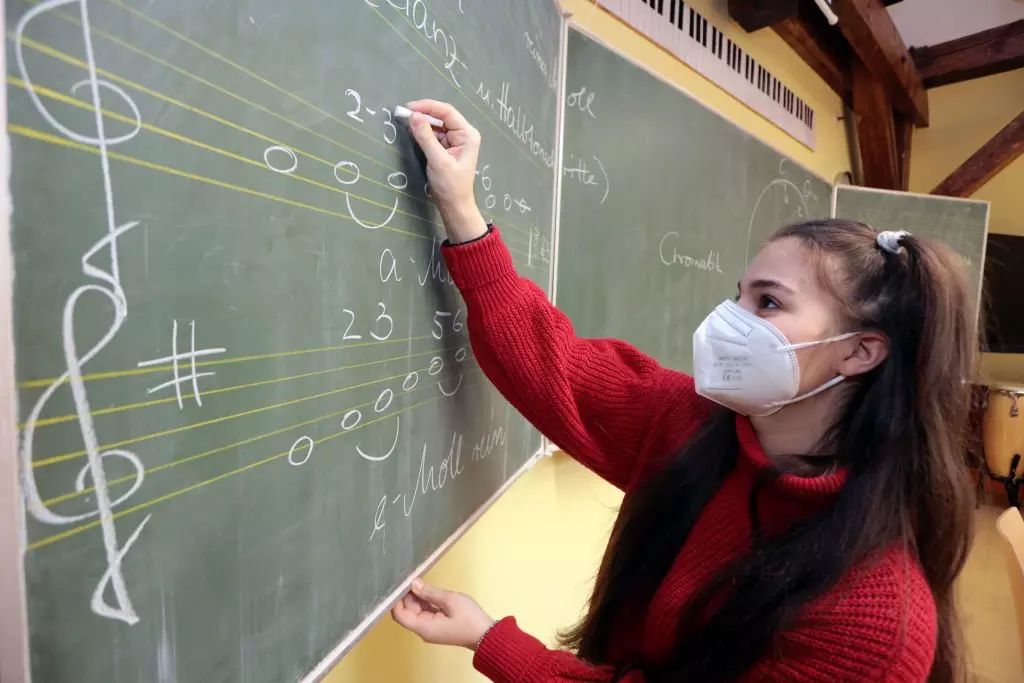
5 Music Teachers Share The Transformative Power Of Music Education
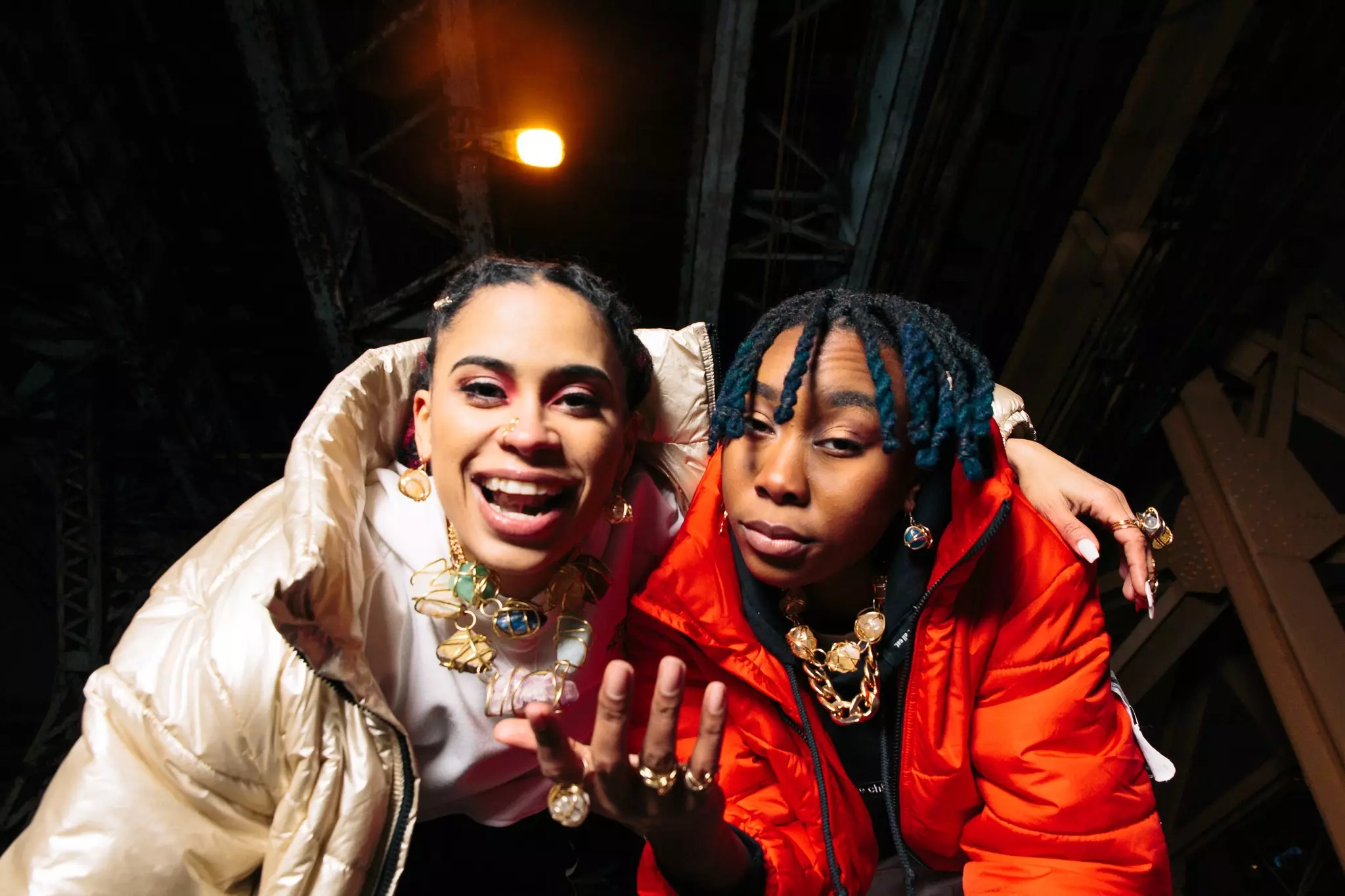
Meet Mother Nature, The Chicago Rap Duo That Teach & Live Self-Expression Through Their Miseducation Of HipHop Youth Workshops

Photo: Aitor Laspiur
interview
Omar Apollo Embraces Heartbreak And Enters His "Zaddy" Era On 'God Said No'
Alongside producer Teo Halm, Omar Apollo discusses creating 'God Said No' in London, the role of poetry in the writing process, and eventually finding comfort in the record's "proof of pain."
"Honestly, I feel like a zaddy," Omar Apollo says with a roguish grin, "because I'm 6'5" so, like, you can run up in my arms and stay there, you know what I mean?"
As a bonafide R&B sensation and one of the internet’s favorite boyfriends, Apollo is likely used to the labels, attention and online swooning that come with modern fame. But in this instance, there’s a valid reason for asking about his particular brand of "zaddyhood": he’s been turned into a Bratz doll.
In the middle of June, the popular toy company blasted a video to its nearly 5 million social media followers showing off the singer as a real-life Bratz Boy — the plastic version draped in a long fur coat (shirtless, naturally), with a blinged-out cross necklace and matching silver earrings as he belts out his 2023 single "3 Boys" from a smoke-covered stage.
The video, which was captioned "Zaddy coded," promptly went viral, helped along by an amused Apollo reposting the clip to his own Instagram Story. "It was so funny," he adds. "And it's so accurate; that's literally how my shows go. It made me look so glamorous, I loved it."
The unexpected viral moment came with rather auspicious timing, considering Apollo is prepping for the release of his hotly anticipated sophomore album. God Said No arrives June 28 via Warner Records.
In fact, the star is so busy with the roll-out that, on the afternoon of our interview, he’s FaceTiming from the back of a car. The day prior, he’d filmed the music video for "Done With You," the album’s next single. Now he’s headed to the airport to jet off to Paris, where he’ll be photographed front row at the LOEWE SS25 men’s runway show in between Sabrina Carpenter and Mustafa — the latter of whom is one of the few collaborators featured on God Said No.
Apollo’s trusted co-writer and producer, Teo Halm, is also joining the conversation from his home studio in L.A. In between amassing credits for Beyoncé (The Lion King: The Gift), Rosalía and J Balvin (the Latin GRAMMY-winning "Con Altura"), SZA ("Notice Me" and "Open Arms" featuring Travis Scott) and others, the 25-year-old virtuoso behind the boards had teamed up with Apollo on multiple occasions. Notably, the two collabed on "Evergreen (You Didn’t Deserve Me At All)," which helped Apollo score his nomination for Best New Artist at the 2023 GRAMMYs.
In the wake of that triumph, Apollo doubled down on their creative chemistry by asking Halm to executive produce God Said No. (The producer is also quick to second his pal’s magnetic mystique: "Don't get it twisted, he's zaddy, for sure.")
Apollo bares his soul like never before across the album’s 14 tracks, as he processes the bitter end of a two-year relationship with an unnamed paramour. The resulting portrait of heartbreak is a new level of emotional exposure for a singer already known for his unguarded vulnerability and naked candor. (He commissioned artist Doron Langberg to paint a revealing portrait of him for the cover of his 2023 EP Live For Me, and unapologetically included a painting of his erect penis as the back cover of the vinyl release.)
On lead single "Spite," he’s pulled between longing and resentment in the wake of the break-up over a bouncing guitar riff. Second single "Dispose of Me" finds Apollo heartsick and feeling abandoned as he laments, "It don’t matter if it’s 25 years, 25 months/ It don’t matter if it’s 25 days, it was real love/ We got too much history/ So don’t just dispose of me."
Elsewhere, the singer offers the stunning admission that "I would’ve married you" on album cut "Life’s Unfair." Then, on the very next song — the bumping, braggadocious "Against Me" — Apollo grapples with the reality that he’s been permanently altered by the love affair while on the prowl for a rebound. "I cannot act like I’m average/ You know that I am the baddest bitch," he proclaims on the opening verse, only to later admit, "I’ve changed so much, but have you heard?/ I can’t move how I used to."
More Omar Apollo News & Videos

Omar Apollo Embraces Heartbreak And Enters His "Zaddy" Era On 'God Said No'

How Danna Paola Created 'CHILDSTAR' By Deconstructing Herself

On Omar Apollo's New EP 'Live for Me,’ Limitless Experimentation Created Catharsis

Listen To GRAMMY.com's LGBTQIA+ Pride Month 2023 Playlist Featuring Demi Lovato, Sam Smith, Kim Petras, Frank Ocean, Omar Apollo & More

Omar Apollo On “Evergreen,” Growth & Longing
Given the personal subject matter filling God Said No — not to mention the amount of acclaim he earned with Ivory — it would be understandable if Apollo felt a degree of pressure or anxiety when it came to crafting his sophomore studio set. But according to the singer, that was entirely not the case.
"I feel like I wouldn’t be able to make art if I felt pressure," he says. "Why would I be nervous about going back and making more music? If anything, I'm more excited and my mind is opened up in a whole other way and I've learned so much."
In order to throw his entire focus into the album’s creation, Apollo invited Halm to join him in London. The duo set up shop in the famous Abbey Road Studios, where the singer often spent 12- to 13-hour days attempting to exorcize his heartbreak fueled by a steady stream of Aperol spritzes and cigarettes.
The change of scenery infused the music with new sonic possibilities, like the kinetic synths and pulsating bass line that set flight to "Less of You." Apollo and Halm agree that the single was directly inspired by London’s unique energy.
"It's so funny because we were out there in London, but we weren't poppin' out at all," the Halm says. "Our London scene was really just, like, studio, food. Omar was a frickin' beast. He was hitting the gym every day…. But it was more like feeding off the culture on a day-to-day basis. Like, literally just on the walk to the studio or something as simple as getting a little coffee. I don't think that song would've happened in L.A."
Poetry played a surprisingly vital role in the album’s creation as well, with Apollo littering the studio with collections by "all of the greats," including the likes of Ocean Vuong, Victoria Chang, Philip Larkin, Alan Ginsberg, Mary Oliver and more.
"Could you imagine making films, but never watching a film?" the singer posits, turning his appreciation for the written art form into a metaphor about cinema. "Imagine if I never saw [films by] the greats, the beauty of words and language, and how it's manipulated and how it flows. So I was so inspired."
Perhaps a natural result of consuming so much poetic prose, Apollo was also led to experiment with his own writing style. While on a day trip with his parents to the Palace of Versailles, he wrote a poem that ultimately became the soaring album highlight "Plane Trees," which sends the singer’s voice to new, shiver-inducing heights.
"I'd been telling Teo that I wanted to challenge myself vocally and do a power ballad," he says. "But it wasn't coming and we had attempted those songs before. And I was exhausted with writing about love; I was so sick of it. I was like, Argh, I don't want to write anymore songs with this person in my mind."
Instead, the GRAMMY nominee sat on the palace grounds with his parents, listening to his mom tell stories about her childhood spent in Mexico. He challenged himself to write about the majestic plane tree they were sitting under in order to capture the special moment.
Back at the studio, Apollo’s dad asked Halm to simply "make a beat" and, soon enough, the singer was setting his poem to music. (Later, Mustafa’s hushed coda perfected the song’s denouement as the final piece of the puzzle.) And if Apollo’s dad is at least partially responsible for how "Plane Trees" turned out, his mom can take some credit for a different song on the album — that’s her voice, recorded beneath the same plane tree, on the outro of delicate closer "Glow."
Both the artist and the producer ward off any lingering expectations that a happy ending will arrive by the time "Glow" fades to black, however. "The music that we make walks a tightrope of balancing beauty and tragedy," Halm says. "It's always got this optimism in it, but it's never just, like, one-stop shop happy. It's always got this inevitable pain that just life has.
"You know, even if maybe there wasn't peace in the end for Omar, or if that wasn't his full journey with getting through that pain, I think a lot of people are dealing with broken hearts who it really is going to help," the producer continues. "I can only just hope that the music imparts leaving people with hope."
Apollo agrees that God Said No contains a "hopeful thread," even if his perspective on the project remains achingly visceral. Did making the album help heal his broken heart? "No," he says with a sad smile on his face. "But it is proof of pain. And it’s a beautiful thing that is immortalized now, forever.
"One day, I can look back at it and be like, Wow, what a beautiful thing I experienced. But yeah, no, it didn't help me," he says with a laugh.
Latest News & Exclusive Videos

2024 Paris Olympics Opening Ceremony: Watch Celine Dion, Lady Gaga, Gojira & More Perform

Ice Spice Is The Drill Queen On 'Y2K!': 5 Takeaways From Her Debut Album

New Music Friday: Listen To New Songs From Halsey, MGK And Jelly Roll, XG & More

Watch Young MC Win Best Rap Performance In 1990

The Red Clay Strays Offer A New Kind Of Religion With 'Made By These Moments'
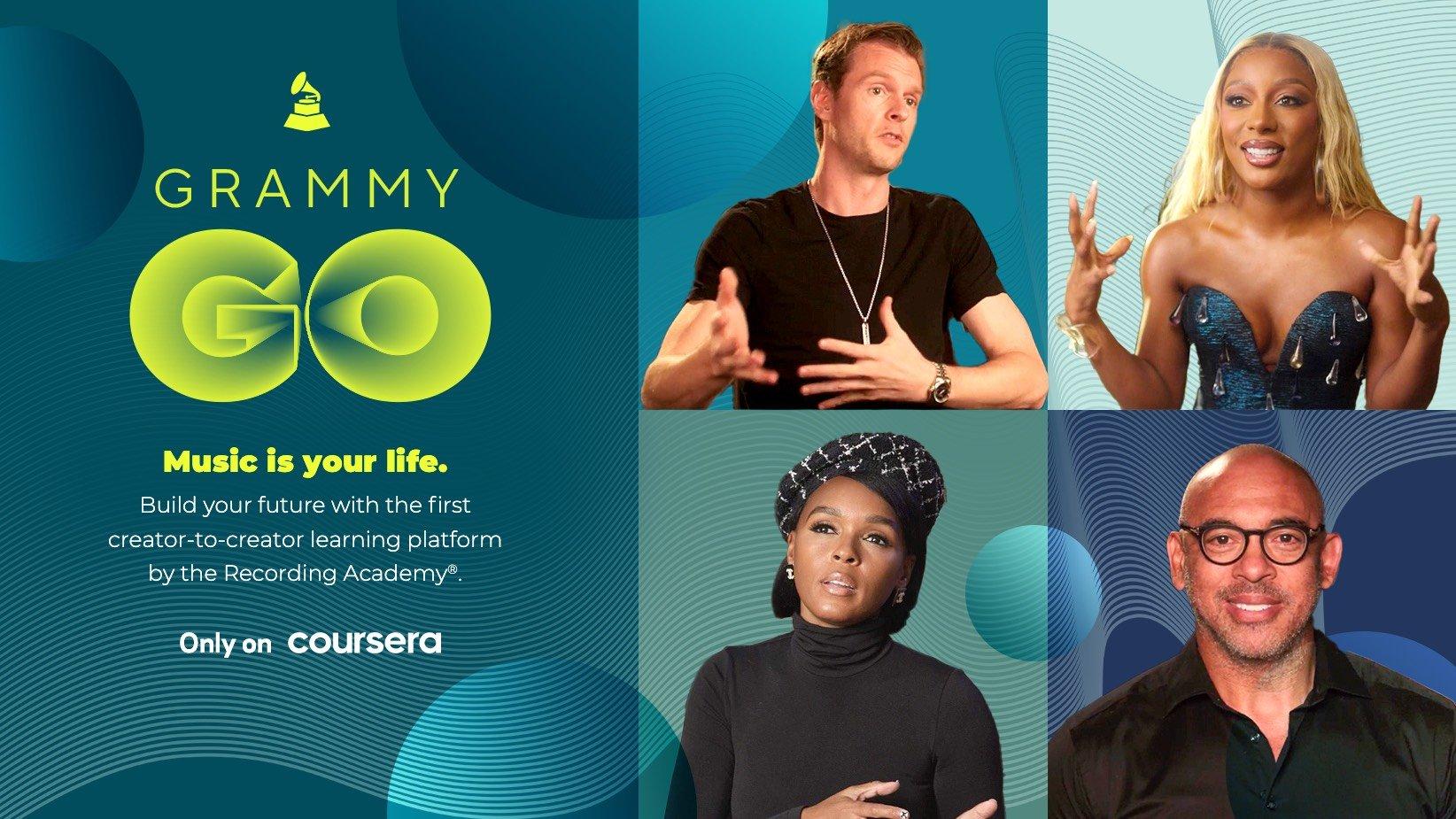
Graphic & Photos Courtesy of GRAMMY GO
news
Recording Academy & Coursera Partner To Launch GRAMMY GO Online Learning Initiative
Class is in session. As part of the Recording Academy's ongoing mission to empower music's next generation, GRAMMY Go offers digital content in specializations geared to help music industry professionals grow at every stage of their career.
The Recording Academy has partnered with leading online learning platform Coursera on GRAMMY GO, a new online initiative to offer classes tailored for music creators and industry professionals.
This partnership empowers the next generation of the music community with practical, up-to-the moment digital content that provides wisdom for both emerging and established members of the industry. Continuing the Academy’s ongoing mission to serve all music people, courses cover a variety of specializations tailored to creative and professional growth.
GRAMMY GO on Coursera includes courses taught by Recording Academy members, featuring GRAMMY winners and nominees and offers real-life lessons learners can put to work right away.
Starting today, enrollment is open for GRAMMY GO’s first Coursera specialization, "Building Your Audience for Music Professionals," taught by Joey Harris, international music/marketing executive and CEO of Joey Harris Inc. The course features Rock & Roll Hall of Fame inductee and five-time GRAMMY winner Jimmy Jam, 10-time GRAMMY nominee Janelle Monáe and three-time GRAMMY winner and the 2024 GRAMMYs Best New Artist Victoria Monét. This foundational specialization will help participants gain the skills, knowledge and confidence to build a strong brand presence and cultivate a devoted audience within the ever-changing music industry.
The partnership’s second course, launching later this summer, aims to strengthen the technological and audio skills of a music producer. "Music Production: Crafting An Award-Worthy Song" will be taught by Carolyn Malachi, Howard University professor and GRAMMY nominee, and will include appearances by GRAMMY winner CIRKUT, three-time GRAMMY winner Hit-Boy, artist and celebrity vocal coach Stevie Mackey, five-time GRAMMY nominee and Recording Academy CEO Harvey Mason jr., and 15-time GRAMMY winner Judith Sherman. Pre-enrollment for "Music Production: Crafting An Award-Worthy Song" opens today.
"Whether it be through a GRAMMY Museum program, GRAMMY Camp or GRAMMY U, the GRAMMY organization is committed to helping music creators flourish, and the Recording Academy is proud to introduce our newest learning platform, GRAMMY GO, in partnership with Coursera," said Panos A. Panay, President of the Recording Academy. "A creator’s growth path is ongoing and these courses have been crafted to provide learners with the essential tools to grow in their professional and creative journeys."
"We are honored to welcome GRAMMY GO, our first entertainment partner, to the Coursera community," said Marni Baker Stein, Chief Content Officer at Coursera. "With these self-paced online specializations, aspiring music professionals all over the world have an incredible opportunity to learn directly from iconic artists and industry experts. Together with GRAMMY GO, we can empower tomorrow's pioneers of the music industry to explore their passion today."
GRAMMY GO also serves as the music community’s newest digital hub for career pathways and editorial content that provides industry insights for members of the industry; visit go.grammy.com for more. For information and enrollment, please visit the landing pages for "Building Your Audience for Music Professionals" and "Music Production: Crafting An Award-Worthy Song."
.jpg)
Photo: Michael Kovac/Getty Images for The Recording Academy
video
GRAMMY Rewind: Watch Beyoncé's Heartfelt Speech For Her Record-Breaking Win In 2023
Relive the night Beyoncé received a gramophone for Best Dance/Electronic Album for 'RENAISSANCE' at the 2023 GRAMMYS — the award that made her the most decorated musician in GRAMMY history.
Six years after her last solo studio album, Beyoncé returned to the music industry with a bang thanks to RENAISSANCE. In homage to her late Uncle Johnny, she created a work of art inspired by the sounds of disco and house that wasn't just culturally impactful — it was history-making.
At the 2023 GRAMMYs, RENAISSANCE won Best Dance/Electronic Album. Marking Beyoncé's 32nd golden gramophone, the win gave the superstar the record for most gramophones won by an individual act.
In this episode of GRAMMY Rewind, revisit the historic moment Queen Bey took the stage to accept her record-breaking GRAMMY at the 65th Annual GRAMMY Awards.
"Thank you so much. I'm trying not to be too emotional," Beyoncé said at the start of her acceptance speech. "I'm just trying to receive this night."
With a deep breath, she began to list her praises that included God, her family, and the Recording Academy for their continued support throughout her career.
"I'd like to thank my Uncle Johnny, who is not here, but he's here in spirit," Beyoncé proclaimed. "I'd like to thank the queer community for your love and inventing this genre."
Watch the video above for Beyoncé's full speech for Best Dance/Electronic Album at the 2023 GRAMMYs. Check back to GRAMMY.com for more new episodes of GRAMMY Rewind.
Tune into the 2024 GRAMMYs on Sunday, Feb. 4, airing live on the CBS Television Network (8-11:30 p.m. LIVE ET/5-8:30 p.m. LIVE PT) and streaming on Paramount+ (live and on-demand for Paramount+ with SHOWTIME subscribers, or on-demand for Paramount+ Essential subscribers the day after the special airs).
